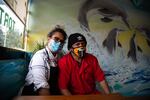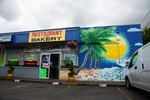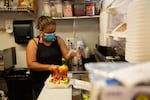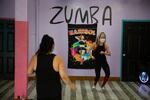Some nights, Ana said, sleep is elusive even after a long but welcomed day of work. The salon owner and part-time bakery worker stays awake wondering: “How am I going to pay my bills?”
“I don’t want to lose my business,” she said through an interpreter as she sat in a guest chair at the salon she opened three years ago. “This is my dream.”

Graciela Flores Rodriguez and her husband, Felipe, pose inside their business, Vera Cruz Bakery. Businesses in Vancouver's international district are struggling in the pandemic.
Troy Brynelson / OPB
She’s one of many people of color who live and work along Vancouver’s Fourth Plain corridor and are watching bills pile up and threaten their place in the city’s international district.
Before the pandemic, the community here worried about gentrification. Then COVID-19 hit, early and hard. Customers disappeared into their homes. Now, besides weathering health concerns, the economic upheaval could destabilize this community more than most.
In a 71% white city, the Fourth Plain corridor is a three-mile-long enclave. Murals depict scenes of national flags ringing the globe, and the Pacific Northwest before European colonization. It’s home to Vietnamese-owned restaurants, Mexican-owned hair salons and Colombian-owned grocery stores.
Of the 130 small businesses, half are owned by people of color, according to city staff. Many employ five or fewer people.
Concerns of gentrification have loomed in recent years, as Vancouver’s grown. Fourth Plain Boulevard is a main thread connecting the city’s downtown to the hub of retail plazas in east Vancouver that sprang up after the I-205 bridge was built.
Meanwhile, the poverty rate in the corridor is almost triple the citywide rate, according to city staff. Nearly three out of every four residents are renters, and many spend between one-third and one-half of their income on rent.

Veracruz Bakery pictured in July 2020. Businesses in Vancouver's international district are struggling in the pandemic.
Troy Brynelson / OPB
For business owners like Ana, bills are piling up at home and at work. Ana, whose name is being withheld because she is undocumented, said she and her husband owe more than $5,000 in rent. That doesn’t include utilities and insurance.
“If it’s open or not,” Ana said of her hair salon, “I have to pay. I have to survive.”
That’s a sentiment heard often by Carmen McKibben of Fourth Plain Forward. The organization sprang up five years ago to help businesses and residents tap into funds and information as gentrification fears grew.
“Now COVID’s here, right?” McKibben said. “We have businesses that are still struggling to make payments.”
With Washington’s moratorium on evictions slated to expire Oct. 15, McKibben said she’s lately devoted to mediation between businesses and landlords. She heard from one business that already plans to relocate because their relationship with their landlord fell apart during the crisis.
McKibben had sympathy for the area’s landlords, too, often small business owners themselves.
“It’s worrisome to not know what’s going to happen,” McKibben said of the moratorium.
City officials don’t track permanent business closures along Fourth Plain. Sydney Johnson, program coordinator, said minority-owned businesses faced rising rents, yet don’t want to leave because their customers live nearby.
“Most of their customers come from the neighborhoods surrounding the corridor, so they want to stay on the corridor and serve that community,” Johnson said. “We were worried this pandemic would displace folks who were already struggling.”
OPB spoke with four owners still operating, who described a perilous imbalance of rising expenses with little income to make up for it.
Originally from Oaxaca, Ana and her daughter moved to America after her husband died of leukemia. She then worked in a bakery for more than a decade, saving up enough to start her hair salon three years ago.
“I like to see that people like their hair when I’m done, like when I make a haircut or color,” she said.

Gabriela Mendoza prepares a customer's lunch at Frutas Locas. The business is one of many in Vancouver's international district struggling in the pandemic.
Troy Brynelson / OPB
After a tepid start, the salon saw its best months on record in January and February, she said. The pandemic erased her progress. Her current husband, who is white, also struggled to find work. The couple received no federal aid because of her citizenship status.
“I know I can’t get those because of my situation, but for him … that’s why I’m feeling bad about him,” she said. She’s picked up hours at the bakery again, starting every workday in the early morning.
“Bills there and bills here and not being able to make money to pay them,” she said. “I’m losing my sleep over that. It’s probably what is affecting me a lot, just to be worried about that.”
In a bid to help struggling businesses in the area, whether they’re eligible for federal funds or not, Fourth Plain Forward started dispersing small grants.
The grants range from $2,500 to $10,000, according to Johnson. Ninety-seven percent of the grants went to businesses owned by people of color, and 77% went to a member of the Latino community.
Funds flew to bills, new cleaning supplies or to restock goods that went bad.
Gabriela Mendoza said she spent her grant as soon as it arrived. The owner of the fruit and Mexican food stand Frutas Locas said her bills persisted in quarantine, unlike her browning mangos and wilting vegetables.
“It goes bad, so you cannot keep it for a long time,” Mendoza said of her lost inventory. “It’s stressful to think that we are depending on what we sell to come up with the money.”
Mendoza’s rent rose $200 per month last year, she said. And now she’s incurring extra costs to reopen, too, in the forms of disinfectant, disposable masks and hand sanitizer. And customers once drawn by homestyle dishes like cuerito and Chamoy have their own financial struggles, she said.
“The few people that come over, they share, ‘You know, even if we want to come more often, we can’t because we lost our jobs,’” Mendoza said.

Marisol Sanchez teaches a class at Zumba Xpression in July 2020. Sanchez is among many business owners in Vancouver's international district struggling to pay bills during the pandemic.
Troy Brynelson / OPB
Veracruz Bay Bakery is managing to stay afloat in part because they stayed open to supply restaurants as they delivered food directly, said owner Graciela Rodriguez Flores. Still, revenues have dropped. There are fewer walk-in customers.
“I was the one really having those helpless thoughts of ‘What am I going to do?’ And my husband was telling me, ‘Just don’t worry, we have work, and we’re going to do it,’” she said. “We’re not sick, so it was a lot of mental struggle.”
For Ana, business came rushing back briefly. Locals who’d gone shaggy over weeks of isolation filed in for haircuts, allowed under Washington’s second phase of reopening. As Clark County entered phase two in early June, she bought handwashing stations and stocked paper towels.
“The first two weeks is when it was a lot busier,” she said. “I’m using a lot of paper towels so I can clean after every person when they come in and I have to clean and toss away that paper towel. And so all those costs add up.”
Then the customers were gone. Hair only grows so fast, for one, and the virus has crept back. Cases have doubled in the last month in Clark County, growing from 719 on June 23 to 1,680 on July 27.
“Now, as you can see, people are afraid to come out,” she said.
Ana said she’s thankful she didn’t get sick. The Latino population in Clark County has been hit harder than most by COVID-19. The latest data, from July 6, shows that community accounted for a quarter of all local cases.
The imbalance could be higher, said Johnson, of Fourth Plain Forward. Communities of color have less access to tests, either because they can’t afford them or they have fewer means to travel to testing sites.
“I’m sure that community has more positive cases that we’re just not aware of,” she said. “Again, this is a working-class community and they can’t stay home and heal themselves.”
That echoes many places across the country. Health experts say one factor is that the community works in lower-paying jobs that were simultaneously deemed “essential” — making them prone to infectious spread.

Zumba attendees dance on marked spots at Zumba Xpression in July 2020. The business is one of many in Vancouver's international district struggling in the pandemic.
Troy Brynelson / OPB
Outbreaks have occurred in food processing plants, meat packing facilities and other agricultural settings brimming with Latino workers. Locally, an outbreak at the fruit packing plant Firestone Pacific in late May largely infected Latino and Pacific Islander staff.
That worries Marisol Sanchez, owner of Zumba Xpresion, who felt helpless when her former daughter-in-law and grandson both contracted the virus early into the pandemic and she couldn’t help from afar.
“I was thinking all night. I wasn’t sleeping,” she said.
Her business reopened under Washington’s phased plan, but the state caps the number of clients per workout class. She’s added more classes to compensate. Each time, they quick-step and sweat in her studio for more than an hour.
“I ask them, if you’re sick, please don’t come in. If you cross that door, it’s because you are feeling good and you can do exercise,” she said. “Please don’t come and make us sick. I don’t want to make you sick or you make us sick.”
Like businesses everywhere, the future is uncertain along Fourth Plain Boulevard. Federal officials plan another round of stimulus money, but details about how much funding will be available and for whom haven’t been made clear.
On Thursday, Gov. Jay Inslee extended Washington’s eviction moratorium, joining other states like Massachusetts and Arizona to extend into October.
Fourth Plain Forward is hoping to secure more grant funding like it had received for its emergency grants. The nonprofit isn’t sure if any grants from local governments will be available to their community, so they’re focusing on asking other nonprofits.
“It really comes down to us, in the end. We have to keep asking for money,” Johnson said. She added they have one grant lined up in September, but that would benefit five businesses total.
In the meantime, most businesses are in “survival mode,” McKibben said.
Yet business owners remain hopeful. When asked about their thoughts on the future, each one said they’ll stay optimistic – even if it’s hard, Sanchez said.
“I tell all my clients, let’s pray and that’s the only thing we can do so things go back to normal, and be all healthy and happy,” she said.
Mendoza, the fruit stand owner said she is thinking about how she can make changes, but quitting altogether was no option. “Here, in Mexico, anywhere — we cannot give up. We have to keep going. And we just have to keep trying,” she said.